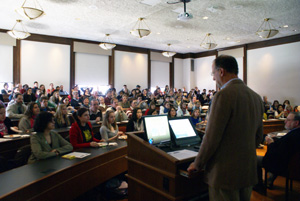Faculty will host a discussion on relief Feb. 5
 Faculty hosted a multi-disciplinary brown bag discussion exploring the scientific and historical issues that set the stage for the crisis in Haiti. A second session, on issues of relief and recovery, will take place Feb. 5 in room 104 of Kirby Hall of Civil Rights. Lunch will be provided.
Faculty hosted a multi-disciplinary brown bag discussion exploring the scientific and historical issues that set the stage for the crisis in Haiti. A second session, on issues of relief and recovery, will take place Feb. 5 in room 104 of Kirby Hall of Civil Rights. Lunch will be provided.
Larry Malinconico, associate professor of geology and environmental geosciences, describes the Caribbean as a hotbed of seismic activity. “The Caribbean plate is wedged in between several major tectonic plates. The earthquake was not unusual for this region,” he explained.
Port-au-Prince, the center of the earthquake, is situated near a fault line. “In one second, the earth moved three and a half feet. Along the fault, the energy is so intense that the motion happens that rapidly,” he said.
Rebekah Pite, assistant professor of history, discussed Haiti’s history. Its turbulent past as a colony of Spain and later France has had lasting effects on the country’s economy. “It is important to keep in mind that Haiti was formed as a plantation economy for a colonial power based on slave labor. The nagging problem after the revolution was how to take a plantation-based economy and do something else with it,” Pite explained. “Today Haiti is the poorest nation in the Western Hemisphere.”
Turmoil caused by shifting political power resulted in the U.S. occupying Haiti between 1915 and 1934. John McCartney, professor of government and law, explained the lasting effects that this occupation has had on Haiti.
The second interdisciplinary brown bag on Haiti will feature Steve Lammers, Helen H.P. Manson Professor Emeritus of the English Bible; Bonnie Winfield, director of the Landis Community Outreach Center; Stephen Kurtz, associate professor of civil and environmental engineering; and David Stifel, assistant professor of economics.
The events are sponsored by the Offices of the President and the Dean of the College, the Landis Community Outreach Center, the Division of Engineering, the Department of Economics, and the Department of Government & Law.
